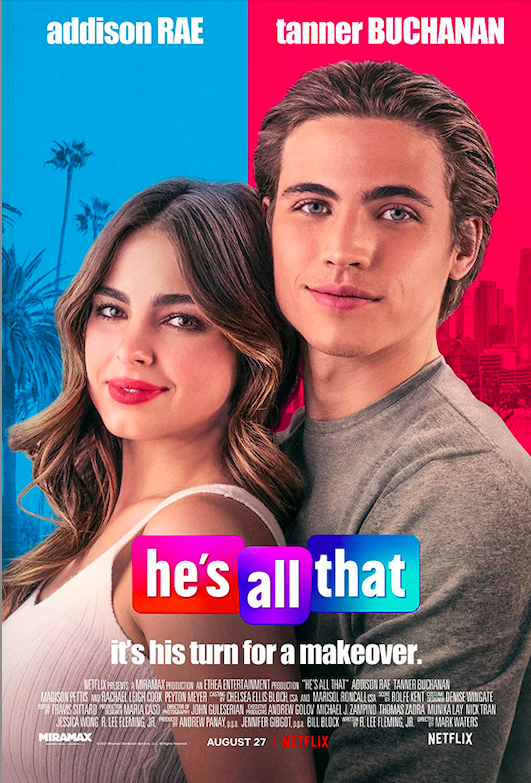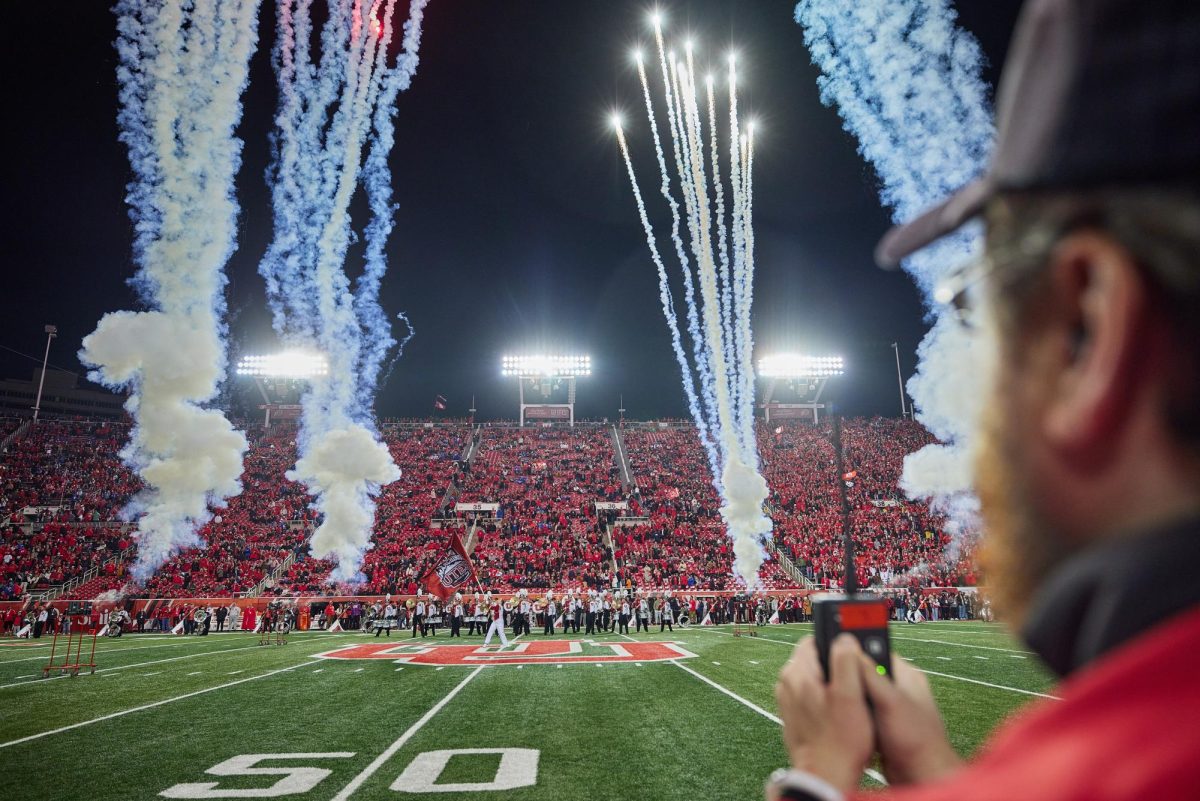‘He’s All That’ Full of Bad Cliches, but Turns Old Stereotypes on their Heads
September 7, 2021
Last Friday, Netflix released “He’s All That” for streaming audiences. The film, starring TikTok darling Addison Rae and “Cobra Kai” actor Tanner Buchanan, is a gender-swapped reboot of the 1999 teenage romantic comedy “She’s All That” with a 2021 update.
With teen rom-coms of the 90s and 2000s being my guilty pleasure, I was pretty excited to see how these new kids would compare to the original’s Rachael Leigh Cook and Freddie Prinze Jr., and how popularity and high school politics would translate in a social climate that rejects many of the tropes that thrived so well at the turn of the century.
This reboot fails on some fronts, with rushed pacing of character development and reliance on worn-out cliches, but they were the same moments I questioned whether it was truly a bad attempt at nostalgia or an informed, tongue-in-cheek throwback.
Trope No. 1: Makeover Magic
The swap of 1999’s Laney Boggs (Cook) as a march-to-the-beat-of-her-own-drum bitter “art girl” to 2021’s Cameron Kweller (Buchanan) as a rebel-for-a-cause “horse boy” was a weird transition that felt like the writers reached into a hat of “weird yet conventional stereotypes” and hodgepodge-d together a personality for their leading man.
Of course, the audience knows he is not popular or cool because he wears scruffy flannel shirts and has long hair, right? This costuming choice was vapid, but set the stage wonderfully for the classic makeover scene.
Like a rite of passage for every good teen film, from “Grease” and “The Breakfast Club” to “Clueless” and “The Princess Diaries,” the makeover scene asks the audience to believe that the rough-around-the-edges character just needs a good polishing to be remarkable.
However, as we’ve seen before in films like “Drive Me Crazy,” the male makeover polish isn’t nearly as exciting as its feminine counterpart. There’s not really a good way to make that big reveal pop when all anyone can do is cut some hair, shave the stubble and add some gel with a boring black suit or a super trendy pair of jeans.
This trope does not benefit from a gender swap, but “He’s All That” followed the original material well and seemed to work for the producers as a tagline for the film.
High School Dynamics and Nostalgic Connections
On the other hand, there seems to be some real thought put into the ideas of social currency when replacing star-athlete Zack Siler (Prince Jr.) with viral influencer Pagett Sawyer (Rae). In tried and true rom-com fashion, both characters garner sympathy as the audience learns that they are good people down deep, but needed to maintain their popularity “throne” in order to get an athletic scholarship or a hefty endorsement that can help them cover the costs of college.
Like its predecessor, “He’s All That” capitalizes on the tropes of wise younger sibling, equally-as-unpopular queer best friend, egotistical fame-seeking significant other who cheats, and a “popular trio” of sidekicks, plus a frenemy to set the whole “bet” in motion.
This film, however, does diversity a lot better than the first one — a testament to the shift in our cultural narratives — and includes a lot more racial representation that goes beyond tokenism. It also includes the normalization of same-sex crushes and prom dates. That sort of diversity and representation is severely lacking in the rom-coms of old and it’s great that this reboot reimagined more than just the basics when bringing it into a new time.
The movie’s cameos from the original “She’s All That” cast were some of the best things about this film. Matthew Lilliard, who returned as the school principal, doing Brock Hudson’s infamous dance during prom, was a great nod to his character in the first movie.
Cook returns as Mrs. Sawyer who, while chaperoning the prom, delivers a perfect nostalgic aside in wondering how she knows the song “Kiss Me” by Sixpence None The Richer as it’s blaring from the school’s PA.
These moments along with other reminiscent subtleties like the red prom dress, the choreographed prom dance-off and the infamous “I was a bet?!” speech show these screenwriters were familiar with their source material and really know how to capitalize on the nostalgia of millennials like me.
Overall, this film was enjoyable, albeit cringey, and definitely something worth watching on a lazy Saturday afternoon. It’s nothing groundbreaking but still worth the time. It also is worth the examination of tropes used in this movie and created by this movie vs. throwbacks and nostalgia reboots and all of the ways that the reflections and evolutions of our social narratives show up even in silly teen romantic comedies.












